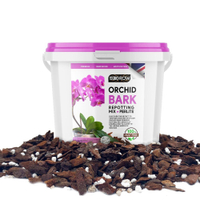How often should I water my orchid? Plant experts share advice for the perfect watering routine
As one of the most sensitive plants, orchid care can seem impossible but with this expert-recommended watering routine you can't go wrong
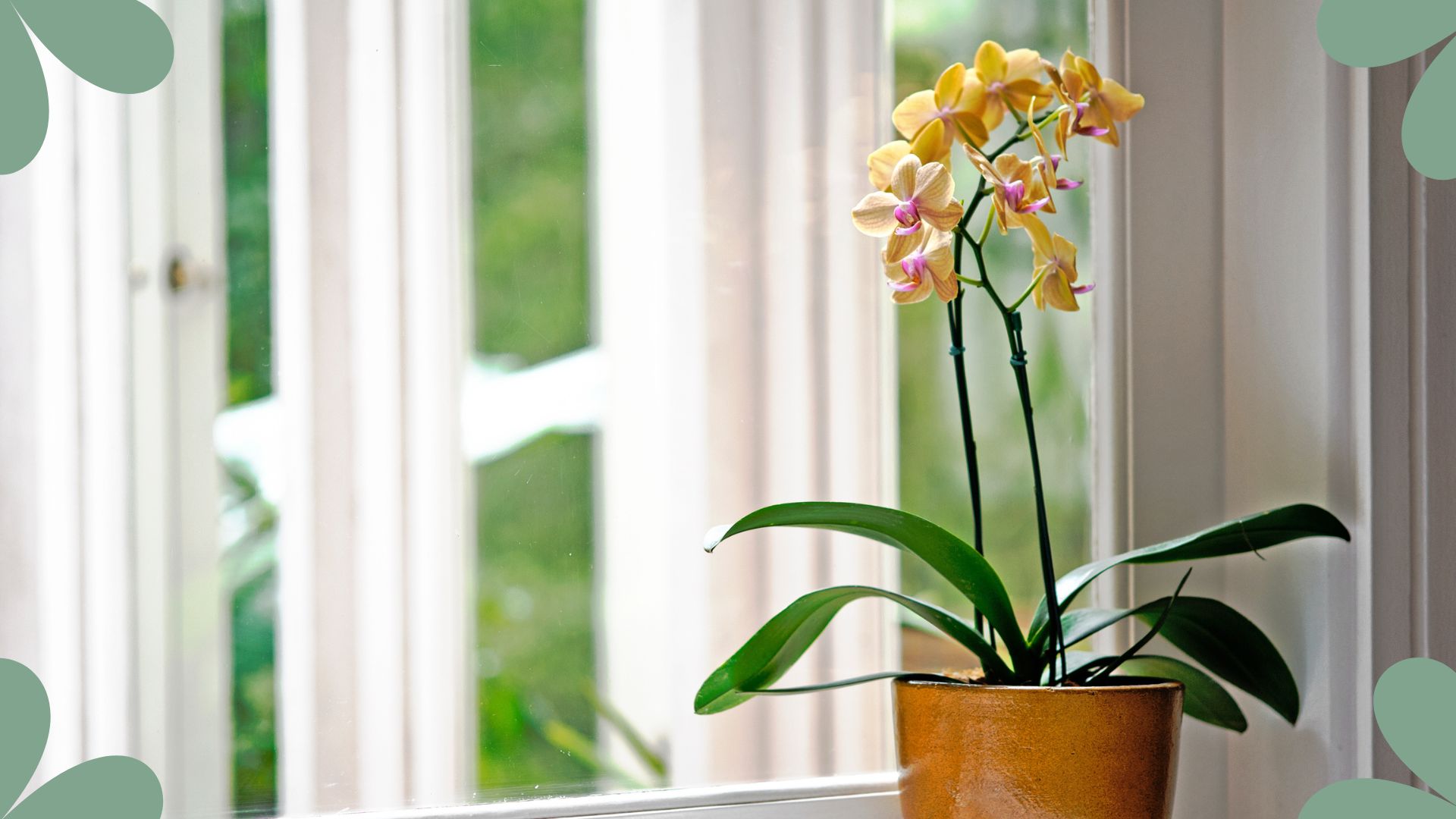

Caring for an orchid can seem like an impossible task, with its particular preferences and sensitive roots it's difficult to keep the plant happy. Even knowing what watering routine to have for the plant is hard work, which is why we spoke to plant experts to get their advice.
Knowing how to care for an orchid is no easy feat, it's a demanding plant and one of the top five hardest houseplants to keep alive. Trying to find a watering routine that works for your plant and its conditions can be a frustrating task, and may result in you wondering why your orchid leaves are turning yellow.
With this in mind, we spoke to the plant experts for their advice on how to perfect a watering routine that will not only keep your orchid alive but also allow it to thrive.
How often should you water an orchid plant indoors?
Knowing how often you should water your houseplants, no matter the species can seem like a balancing act trying to cater for all the different water preferences and needs. This act becomes all that more difficult when you add an orchid into the mix.
Speaking to plant expert at Budget Seeds, Craig Morley, he says, "How often you need to water your orchid will vary depending on the environment that it is growing in. Factors that can affect this include the temperature of your home, how much light the plant is receiving, the potting mix that the orchid is in and the container that the plant is in."
It's no surprise then that over or under-watering is one of the most common houseplant mistakes to avoid. Luckily Craig has some advice, he explains that you should aim to water your orchid every seven to eleven days, or whenever you notice the potting mix is dry.
"Be cautious that you are not overwatering the plant, as this can cause damage and lead to conditions such as root rot. The potting mix that contains the plant should be thoroughly moistened after watering, and it will then need to be left to dry out completely before watering again," says Craig.
Sign up to our free daily email for the latest royal and entertainment news, interesting opinion, expert advice on styling and beauty trends, and no-nonsense guides to the health and wellness questions you want answered.
To check if the soil mix is dry enough to be watered again then you can simply push your finger around two or three centimetres into the soil, if it feels dry it's time to water your orchid again.
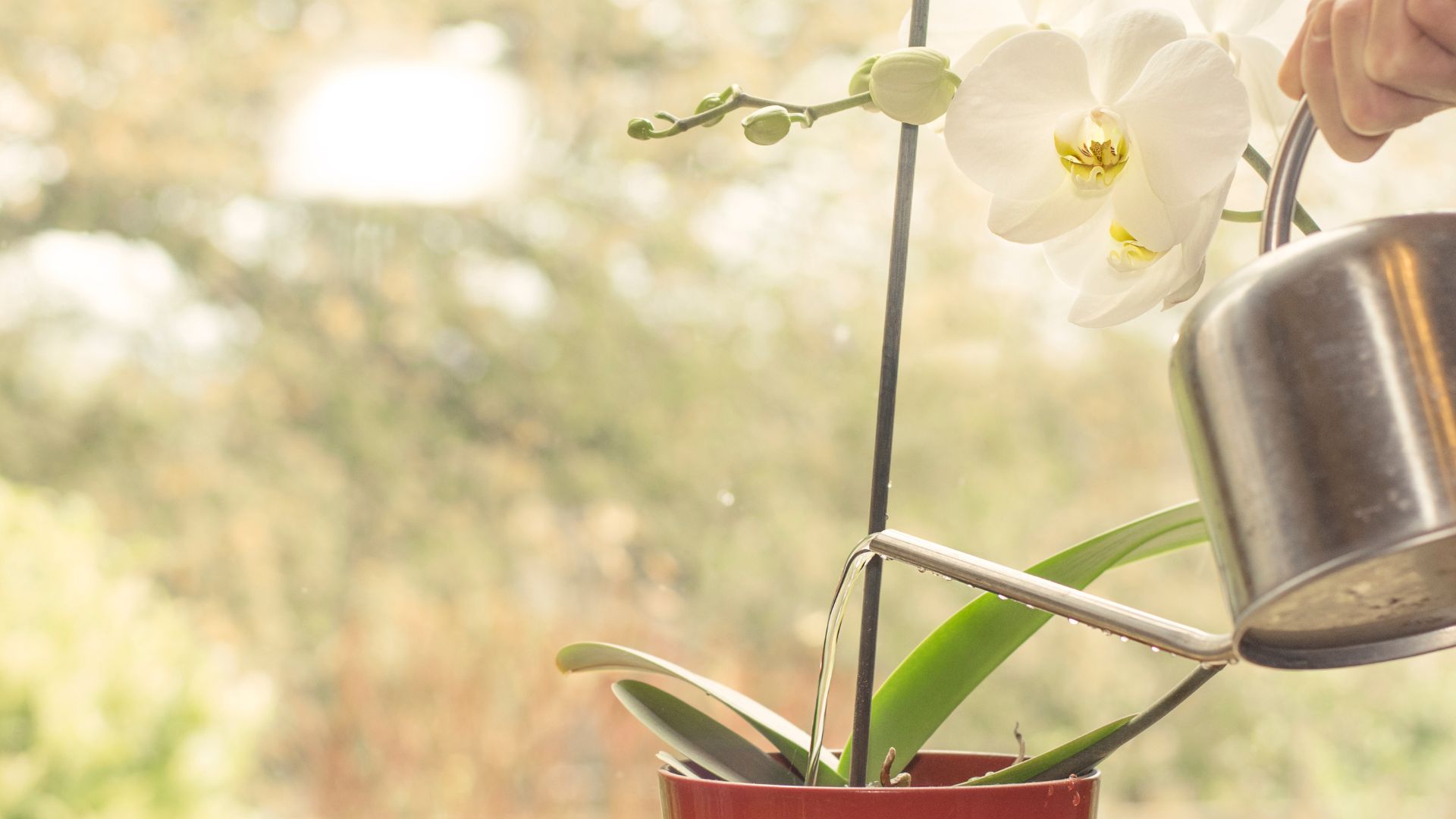
How should you water an orchid in bark?
Unlike some of the other best indoor plants for your health and well-being, orchids can be potted in different mixes and with bark or moss which will slightly change their watering needs.
"When watering an orchid contained in bark, you should be aiming to saturate the bark pieces. This can be easily achieved by placing the entire pot into a bowl that is at least as deep as the bark line of the pot," explains Craig.
Continue by pouring water over the barks until the bowl is full to just below the lip of the pots and let it soak for ten to fifteen minutes. After that, Craig says to lift the pot out of the bowl of water and completely drain all excess water before putting your orchid back in its usual place.
Premium 1L Orchid Bark and & Perlite mix: £7.99 at Amazon
Looking for some replacement bark for your orchid? Or perhaps you didn't know the benefits until now, either way, this orchid bark from Amazon will provide your plant's roots an optimised environment. It's also been sterilised safely and comes in a reusable bucket!
How should you water an orchid in moss?
When it comes to how to care for your plant when it's in moss, there is a little bit of difference to the steps above but not much.
Josh Novell, director of Polhill Garden Centre, says, "Orchids potted in sphagnum moss have slightly different watering needs. Moss retains moisture more effectively than bark, so it's important not to overwater your plant and cause root rot."
If your plant is in moss, then you need to moisten the moss thoroughly but avoid letting it become waterlogged, Josh explains that you also need to allow the top layer of moss to dry out slightly between waterings to prevent any root rot.
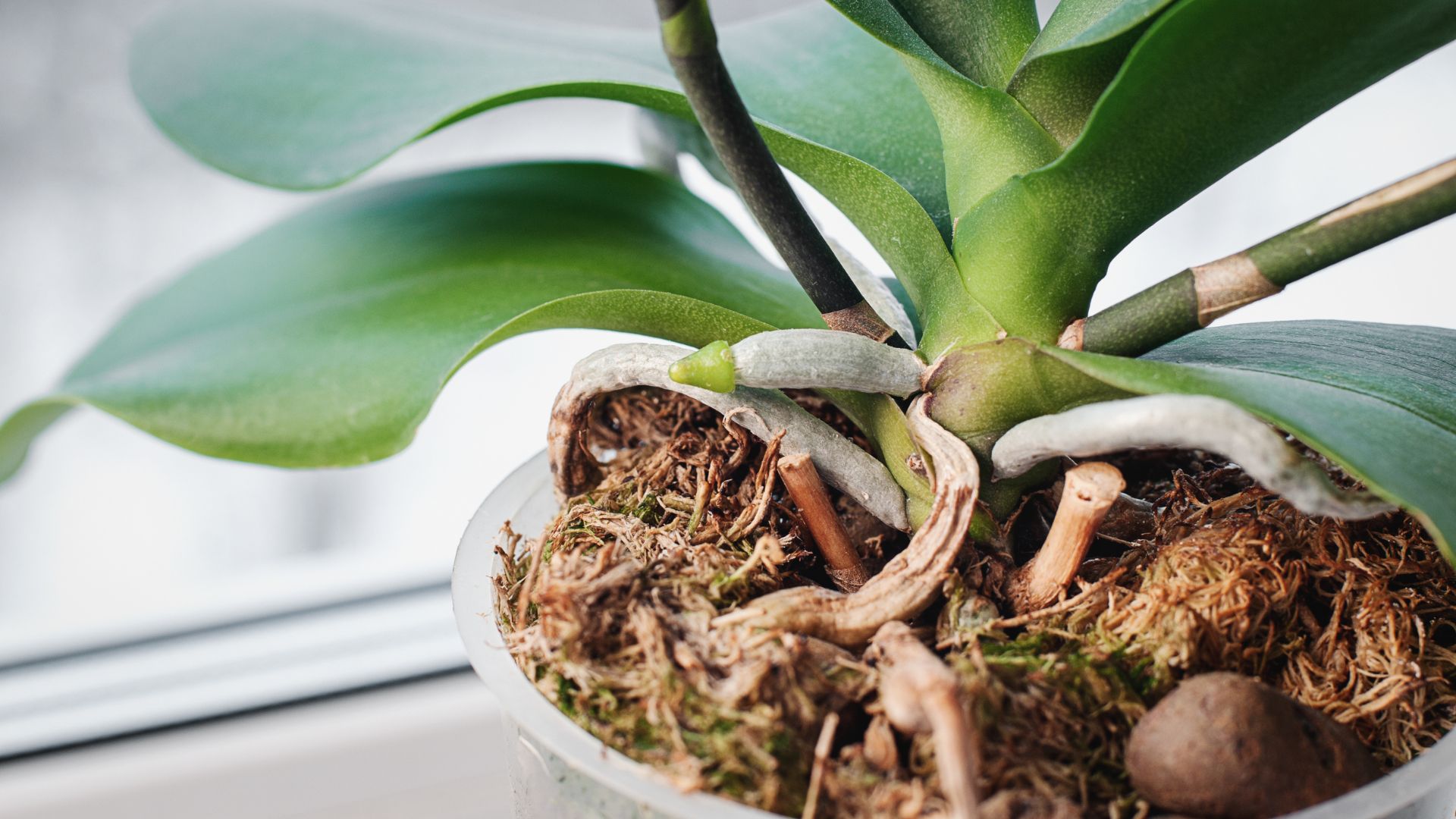
FAQ
Can you use tap water to water your orchid?
The quality of the water you're using can also have an effect on the orchid, similar to how it can be one of the reasons your peace lily leaves are drooping.
"Tap water can be used to water orchids, but it's essential to consider the quality of your tap water. Orchids are sensitive to chemicals like chlorine and fluoride found in tap water, which can harm their roots," explains Nadezhda Yaneva, a professional gardener at Fantastic Gardeners.
Should the water you use be highly chlorinated or contain high levels of minerals then Nadezhda suggests using filtered or distilled water instead. Otherwise, you can let tap water sit out for 24 hours which will allow the chlorine to dissipate before using it to water your orchids.
Should you mist your orchid?
Misting a plant is often a care instruction many forget to do, similarly to how you may not know how to clean your plant leaves or to deal with guttation. However, when it comes to orchids, some species will benefit massively from being misted.
Nadezhda explains that orchid species that naturally grow in humid environments will love being misted. She says, "Mist orchids with fine water droplets in the morning to mimic dew formation. Avoid misting orchid flowers directly, as this can cause them to spot or rot."
It's important to monitor humidity levels and adjust your misting frequency accordingly, if the environment is particularly dry then misting once or twice a day may be beneficial. Nadezhda says that orchids potted in moss may require less frequent misting compared to those in bark, as moss retains moisture better.
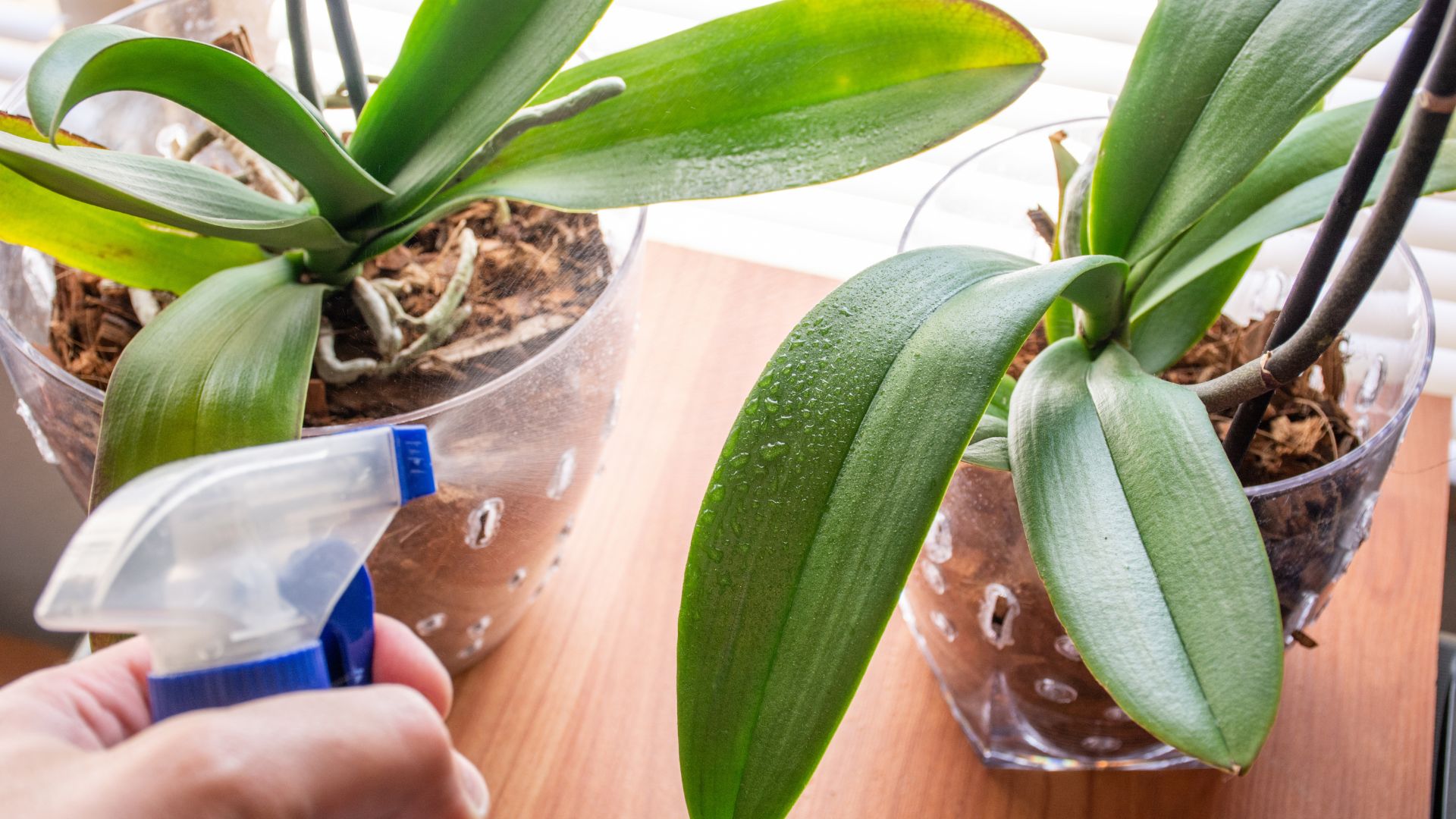
After hearing all of the professional advice, hopefully setting up your plants new watering routine will be that much easier and stress-free. The key point to remember is to avoid waterlogging your plant in any way, after all you don't want to set up a perfect watering routine just to be handed a rotting plant!

Emily joined woman&home as a staff writer after finishing her MA in Magazine Journalism from City University in 2023. After writing various health and news content, she now specialises in lifestyle, covering unique cleaning hacks, gardening how-tos, and everything to help your houseplants thrive.
